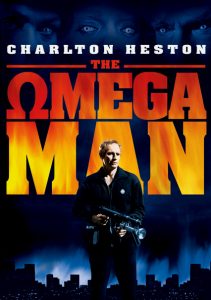The Omega Man-1971
Director Boris Sagal
Starring Charlton Heston, Rosalind Cash
Scott’s Review #1,168
Reviewed August 2, 2021
Grade: B
Watching a film in 2021 about a global pandemic that was made in 1971 conjures many interesting nuances and comparisons and brings fresh relevance to the story.
Throw in vaccinated versus non-vaccinated debate and the similarities are downright eerie.
Given this relevance, I wish that I had found The Omega Man (1971) more engaging than I did. It’s not a bad watch and delivers a very progressive interracial romance and cool exterior scenes of downtown Los Angeles but the story doesn’t live up to the potential that the premise would suggest.
I kept thinking of Charlton Heston, who stars, in two of his other science fiction roles- Planet of the Apes (1968) and Soylent Green (1973), also directed by Omega Man director, Boris Sagal. Planet of the Apes is of course a classic.
In the first scene, Robert Neville (Heston) wanders the streets of Los Angeles. We quickly surmise that he is the last man left on earth. Armed with an experimental vaccine for the disease that’s turned everyone into light-averse zombies, he fights a biological war, roaming the empty streets by day and fighting off the mutated creatures at night.
The premise immediately reminded me of a famous Twilight Zone episode.
On paper, the storyline sounds fascinating with many possible directions it could go in and nuances to explore. Sadly, the direction that Sagal chooses to go in feels lackluster and dull.
Neville hunts and kills as many members of “the Family”, a cult of plague victims who were turned into nocturnal albino mutants as he can. The Family in turn seeks to destroy all technology and kill Neville, who has become a symbol of the science they blame for humanity’s downfall.
They try to kill each other but “the Family’s” motivations and reasoning make little sense. If they destroy technology what will they do? And why not just get the vaccination? These bits may have been explained but I didn’t take notice.
The parallels between the film and the Covid-19 pandemic of 2020-2021 and perhaps onward are uncanny. Maybe the modern unvaccinated will turn into creepy-looking creatures with pale glowing eyes? One can only hope.
There is also a hokey idea of Neville believing that extending his immunity to others may be possible by creating a serum from his blood.
I didn’t feel very engaged by the story but I was very interested in the romance between Neville and Lisa, played by Rosalind Cash. Lisa is a black woman who arrives on the scene with her infected and dying brother.
For 1971, having a mainstream interracial romance is a huge win for diversity and inclusion though the film stops short of having the pair consummate their relationship. This is quite conspicuous. There is also not a whole lot of chemistry between Heston and Cash but I was rooting for them anyway. It is thought that their kiss is the first interracial kiss in cinema history.
Suffice it to say the conclusion isn’t very satisfying but I’ll leave it right there to avoid spoilers.
The science fiction genre is a tough one to tackle. The bar is set pretty high with 2001: A Space Odyssey (1968) the greatest science fiction film ever made. Too many times the story is hokey or not imaginative enough and that’s what makes The Omega Man lose some points.
Parts are inspiring and parts are goofy but the progressive slant makes The Omega Man (1971) an above-par cinema experience. The unexpected parallels to a global situation some fifty years later are remarkable in themselves.
